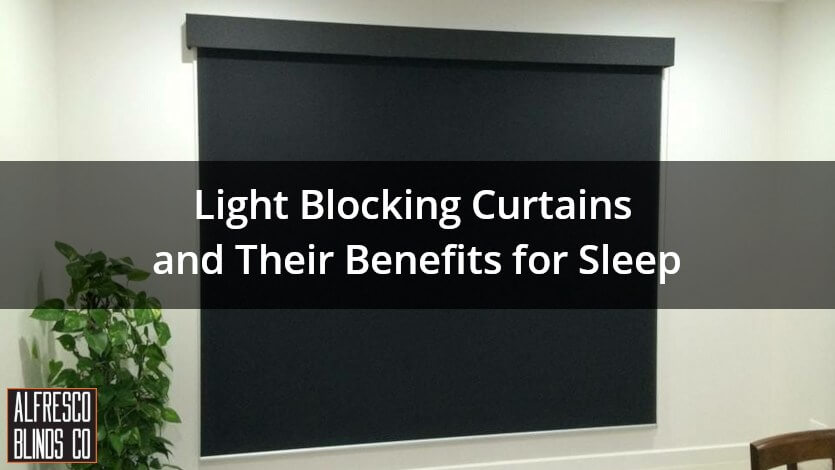
Light blocking curtains can be one of the key factors in the ever-changing quest for optimum health, where the human need for sleep has never been questioned. This crucial part of our everyday functioning can be interrupted by a range of external factors, leading to us performing at a lower level through the day than we are capable of. When your bedroom is flooded with natural or artificial light, your sleep cycles are disturbed and your body pays the price.
Luckily, there are affordable and easy home improvements you can make to take control of exactly how much sleep you get each night. Installing light-blocking curtains in your bedroom offers physiological benefits that scientists and health experts are only just starting to realise.
In this article, we’ll be discussing why it’s so important that we get enough sleep, the factors that affect this, and the advantages of simple, light-blocking curtains.
Although it feels as though our bodies and minds completely shut down during sleep, this isn’t the case. Sleep is a chance for humans to process information, restore injuries and strains, and strengthen our muscles.
When we sleep, everything we learned during the day is slowly being cemented in our brains and muscle memory. Similar to a filing cabinet, the data we’ve taken in needs to be sorted, processed and stored, and sleep is the perfect chance to achieve this as we pause the information overload.
Additionally, our bodies need long periods of uninterrupted sleep to rejuvenate and grow muscle, repair tissue, and harmonise our hormones. When we wake up early due to external factors, we’re losing valuable time for our bodies to recover and develop. If this disruption is a constant occurrence, the body and mind start to show symptoms of fatigue, including headaches, blurred vision, aching muscles, poor concentration, and diminished motivation.
The typical adult needs around 7-9 hours of sleep per night; however, tossing and turning for 8 hours could actually be doing you more harm than good. If we don’t get at least 1.5-1.8 hours of deep sleep per night – that’s the stage where our muscles relax to complete stillness – our body won’t get to completely engage in its natural healing processes.
Light is a major variable in our sleep cycles. It affects us by making it harder to fall asleep and then changing the body’s internal clock. Light alters our internal clock through light-sensitive cells in our retinas. These cells help the brain determine whether it is day or night, shifting our sleep patterns accordingly. This can be extremely frustrating for people working night shifts because their brains are sounding an alarm that it’s time to get out of bed when they’ve just laid down.
Sunlight isn’t the only culprit. No one can deny the ways in which electric light has progressed human development; however, we are now exposed to large levels of light when we were once in complete darkness. Exposure to light in the middle of the night can reset our internal clock and make it near-impossible to fall back asleep.
We’ve all been affected by light exposure while sleeping at least once, and no one enjoys it. Unfortunately for some people, their professions make sleep deprivation a common part of their lives. Police officers, doctors, nurses, firefighters, factory workers, and cleaning staff are at the highest risk of shift-related sleep disorders. According to the Canberra Times, approximately 14% of Australians were required to work night shifts or irregular hours in 2015.
Those in the service industry, such as bartenders, are also at a higher risk of exhaustion and work-related accidents because sunlight tells their bodies to awaken even when they are physically exhausted. You may have laid in bed for 10 hours but repetitive waking is not healthy.
Even dayshift workers can be affected by light and sound exposure, especially those who live in the inner city or on busy streets. When you’re sleep deprived, artificial light streaming through your window can feel as powerful as the sun.
Light-blocking curtains have three main functions; block light, block sound and insulate the room. These are the three crucial aspects of a good night’s sleep. Installing block-out curtains is a simple and affordable way to regulate your sleep schedule and wake up to a set alarm, rather than by the sun or noisy traffic outside your window. With blackout curtains, you control how much light enters your bedroom at any time of the day.
With sunlight comes heat. This is another problem for day sleepers, especially during the Australian summer. The body needs to cool down while it rests and a smouldering bedroom can add to how many times you wake up, pulling you further away from the 1.8 hours of deep sleep you need. High-quality curtains can stop sunlight from entering a room while keeping it insulated. Insulation reduces your energy costs because most homes lose up to 25% of their thermal energy through the windows. Blackout drapes keep the heat in during winter and reflect heat out of the room in summer.
Having effective and affordable curtains installed in your bedroom and/or living room will change the way you sleep. When you speak to knowledgeable manufacturers and installers, such as Alfresco Blinds Co, the design is completely in your hands. Curtains should match your home’s décor while they achieve their main purpose which is why you can design your own by choosing the fabric, style, size, and accessories.
Based in Epping, Victoria, Alfresco Blinds Co manufactures and installs a range of high-quality window furnishings for customers all over Melbourne. Our block-out curtains allow for excellent light control, privacy and outside noise reduction while insulating your home in every season. Installing drapes with thermal lining can save you up to 50% on your energy consumption each year while restoring your sleep pattern.
Get in touch with the friendly team at Alfresco Blinds Co by calling 1300 735 077 or contacting us online. We offer a free quote and measure service to make sure your curtains are perfectly fitted so you can finally get a good night’s (or day’s) sleep.

